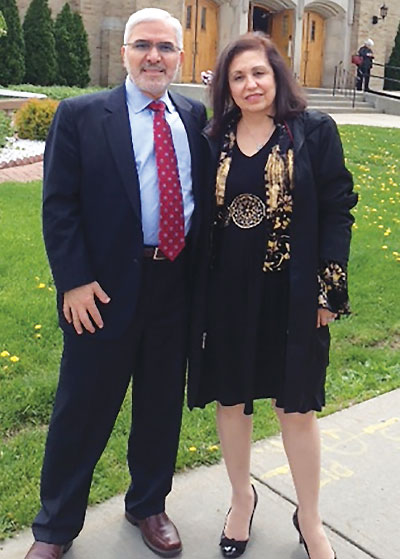APA Member’s Gift to Fund Psychiatric Neuroscience Lecture
Abstract
Henry A. Nasrallah, M.D., and Amelia Nasrallah, M.A., wanted to give back to APA and increase knowledge and awareness of the latest psychiatric neuroscience research.

Henry A. Nasrallah, M.D., and Amelia Nasrallah, M.A., value brain research as an important aspect of psychiatry. “Everything psychiatrists and psychoanalysts do is actually based in neuroscience,” Henry Nasrallah, M.D., says.
A generous donation to the APA Foundation from long-time APA member Henry A. Nasrallah, M.D., and his wife, Amelia, will fund the Nasrallah Family Award for Advances in Psychiatric Neuroscience.
Nasrallah, a professor of psychiatry, neurology, and neuroscience at the University of Cincinnati College of Medicine, has supported APA for over 40 years as a member and distinguished life fellow, as well as an active attendee and presenter at APA’s Annual Meeting and member of APA committees.
The winner of the annual award, which includes a $5,000 honorarium, will present a lecture at APA’s Annual Meeting detailing the latest developments in psychiatric neuroscience.
“APA is the most important psychiatric organization in the world,” Nasrallah said. “I thought the time was right to give the Foundation a gift that would make a difference.”
Amelia Nasrallah, M.A., Nasrallah’s wife, is a psychologist who previously served as director of clinical research management in the Department of Psychiatry and Behavioral Neuroscience at the University of Cincinnati and currently works as senior managing editor of Schizophrenia Research and Biomarkers in Neuropsychiatry. Brain research in psychiatry is important to them both, Henry Nasrallah said.
“Neuroscience is a very important part of psychiatry, and as a psychiatric neuroscientist, I wanted to promote neuroscience literacy among my APA colleagues,” he said. Psychiatry is rapidly becoming a clinical neuroscience discipline, in addition to being a psychosocial discipline, he added. “By establishing a lectureship about psychiatric neuroscience at the Annual Meeting, I hope it will be a tangible way that we can transmit that message and help bring world-class psychiatric neuroscientists to speak,” he said.
Separating psychiatry and neuroscience has created the misconception among the public, and sometimes among professionals, that the mind and brain are somehow separate entities, Nasrallah said. But the most important job of the brain is to generate the mind, he pointed out.
Bridging the gap between psychiatry and neuroscience would help patients who suffer from the stigma that surrounds mental illness. Many mental illnesses are thought to be the fault of the patient or a sign of weakness.
“Nobody stigmatizes someone with stroke or Parkinson’s disease,” Nasrallah said. “Actually, those patients receive a lot of compassion. I want the same thing for people with schizophrenia or bipolar disorder. We must erase the stigma that harms our patients, makes them feel miserable, and discourages many psychiatric patients from seeking potentially life-saving medical care.” ■



